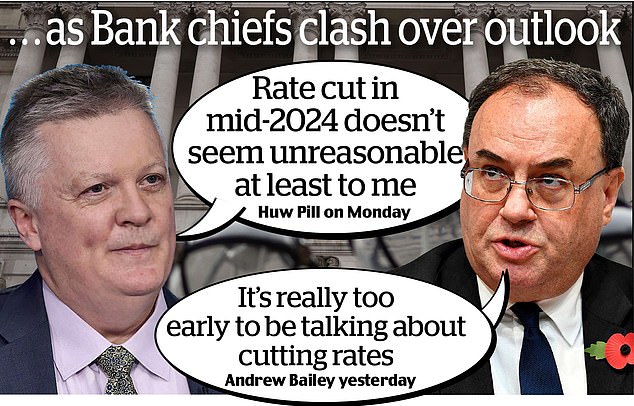Nationwide cuts mortgage rates to below 5%… as Bank chiefs clash over outlook
Homeowners can get two-year mortgage rates below 5 percent for the first time in months as lenders continue to cut borrowing costs.
With senior Bank of England officials at odds over the outlook for interest rates, Nationwide Building Society today cut the cost of its two-year fixed deals for new customers by 0.25 percentage points.
Homeowners with a 40 per cent interest in their home can now take out a two-year deal at 4.99 per cent with a fee of £999.
This follows a wave of rate cuts by Royal Bank of Scotland, NatWest, HSBC and Virgin Money earlier this week.
But according to MoneyfactsCompare, the average two-year fixed-rate deal was still 6.24 percent yesterday.
Rate reduction: Nationwide Building Society today reduced the cost of its two-year fixed deals for new customers by 0.25 percentage points
And Nationwide said it was ‘the first major high street lender to again offer a two-year fixed rate below 5 per cent’.
Lewis Shaw, of broker Shaw Financial Services, described the move as a “watershed moment” for the mortgage market.
“This means we see other lenders following suit, which will lead to a much more competitive market in the coming months,” he said.
Borrowing costs soared as the Bank of England raised interest rates from a record low 0.1 percent in December 2021 to 5.25 percent in a bid to tackle skyrocketing inflation.
The Bank has left interest rates unchanged at its last two meetings, but is giving hope that borrowing costs have peaked.
But speaking in Dublin yesterday, Governor Andrew Bailey insisted it was ‘really too early to be talking about rate cuts’.
Meanwhile, the central bank’s chief economist Huw Pill said earlier this week that the idea of a rate cut in August next year “doesn’t seem totally unreasonable.”
These comments stirred bond markets as they appeared to be the Bank’s first signal that real cuts were on the way.
This view appears to have been reflected in the mortgage market as borrowing costs have fallen.

Clash: Bank of England Governor Andrew Bailey tried to quash talk of interest rate cuts, just days after chief economist Huw Pill hinted at a rate cut as early as August next year
But Bailey’s comments were backed by the International Monetary Fund, which argued that interest rates in Britain ‘will have to remain high for an extended period’.
This came amid the latest evidence that high interest rates are hurting the UK economy.
A poll by the Royal Institution of Chartered Surveyors (RICS) showed that new home buyer applications fell for the 18th month in a row in October and the ‘very negative’ picture for house prices looks set to continue with further falls in the next twelve months.
A report from PwC predicted that tomorrow’s figures will show that the economy shrank by 0.1 percent in the third quarter. “The main reason for slow growth in Britain is monetary policy,” PwC said.
After the apparently contradictory signals from Bailey and Pill, the markets are now seeing interest rates falling slightly faster than before.
Traders are betting on just over a 50 percent chance of a rate cut in June, with a second one likely in November next year.
However, Bailey tried to quash the speculation, saying: “The policy will have to be restrictive for a longer period of time.”
